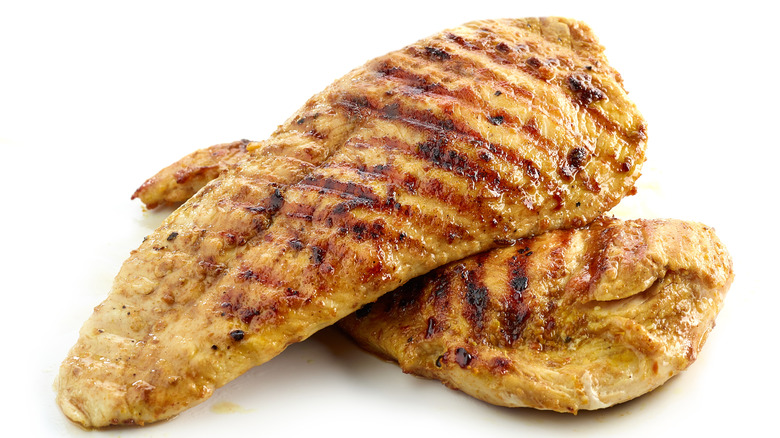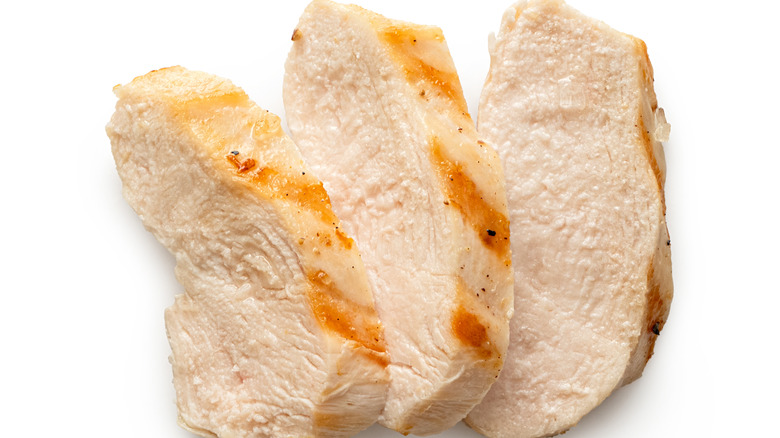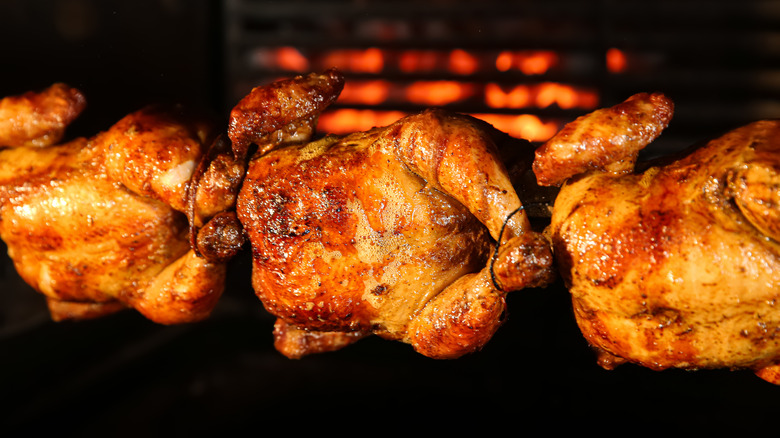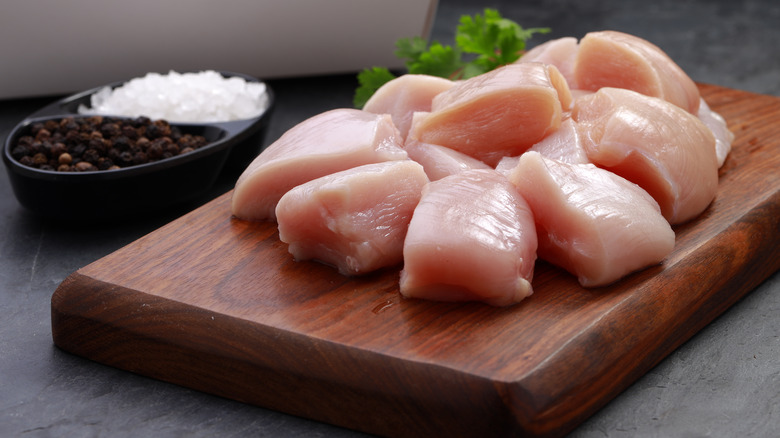When You Only Eat Chicken, This Is What Happens To Your Body
Imagine eating chicken for every meal each day. Referred to simply as "the chicken diet," this method of eating is said to promote rapid fat loss with little-to-no focus on meal planning (via Healthline). This eating plan is part of a group of diets called mono, or monotrophic, dieting, which focuses on just eating one food for every meal each day (via U.S. News and World Report).
The chicken diet made headlines several years ago when actor Matt Damon said he ate only chicken breasts to lose 60 pounds for his role in the 1996 film "Courage Under Fire." In a Reddit Ask Me Anything, Damon admitted that this wasn't the healthiest way of eating and only did it for the role.
Experts agree the chicken diet isn't healthy. Stacey L. Pence, a registered dietitian at the Ohio State University Wexner Medical Center, told U.S. News & World Report that some bodybuilders chose this type of mono diet focusing on just protein "under the false belief that it will help build muscle and keep body fat down."
"This type of diet is never a good idea," she continued. "It's one of the most extreme diets, with no chance of long-term success but with many chances for causing health problems."
Why you should avoid the chicken diet and other mono diets
Mono diets like the chicken diet can have several negative health effects (via Healthline). First, relying on just one food for all your energy needs can lead to nutrient deficiencies. While chicken is a good source of protein, vitamin B6, phosphorous, niacin, and selenium, it lacks several important nutrients like vitamin C and folate. Since nutrient deficiencies can develop quickly, staying on the chicken diet for even a short time can put you at risk.
Following a mono diet can also lead to unhealthy eating habits. Cutting whole food groups completely can lead to lasting psychological effects, such as anxiety or guilt when returning to more normal eating habits. This is a symptom of disordered eating.
For most people, the chicken diet is also too restrictive and unsustainable. Eating the same food for all your meals every day can get monotonous and lead to diet fatigue, making it very difficult to follow. This could cause people to stop eating for weight loss and in turn lead to overeating and weight gain. This type of dieting, often called "yo-yo dieting," is unhealthy and can put you at risk for a number of health problems.
Eating only chicken can lead to weight loss or weight gain
Eating a chicken-exclusive diet may result in weight loss initially, as Healthline reports that protein can leave us feeling fuller for longer periods of time. Therefore, one may find themselves eating less overall on a chicken-only diet.
It is also possible that eating only chicken may lead to weight gain. According to the Mayo Clinic Health System, our body can only do so much with protein. If we exceed our body's needed daily intake of protein, the body stores what's left over as fat. For context, experts suggest dedicating 10% to 35% of our caloric intake each day to protein. Using a 2,000-calorie diet as an example, one would then want to aim for 50 to 175 grams of daily protein, the equivalent of 200 to 700 calories. SFGate reports that a 4-ounce serving of grilled chicken breast serves up 35 grams of protein. Eating multiple servings of chicken multiple times a day can quickly get us to our recommended daily intake of protein and beyond. Of course, everyone's dietary needs will vary. The Mayo Clinic suggests a healthy amount of daily protein intake is 0.8 grams per kilogram of body weight.
The way chicken is prepared could mean too much sodium
Depending on how you prepare your chicken, you may unknowingly be ingesting higher amounts of sodium than you thought. Overconsumption of sodium can affect the body by increasing one's risk of hypertension, heart disease, and stroke, reports the U.S. Centers for Disease Control and Prevention (CDC). In fact, frying your chicken meat in oil poses the greatest risk for increased sodium intake, according to Women's Health Magazine. Rather, sauteing, grilling, or best of all, poaching your chicken are some of the best ways to keep a chicken meal healthy.
When it comes to sodium intake, however, it not only matters how you prepare your chicken, but it can also vary depending on what kind of chicken you buy. A 2013 study published in Procedia Food Science found that between 250 milligrams and 500 milligrams of sodium could be found per 100 grams of commercially available canned turkey or chicken.
You may increase your body's risk of food poisoning
Along with duck and turkey, chicken can leave us particularly susceptible to food poisoning, according to Healthline. In fact, contaminated poultry is responsible for nearly 1 million cases of food poisoning across the country each year, as per the CDC. Because various types of bacteria, such as Salmonella, can be found in raw chicken meat, it's important to ensure that chicken meat is thoroughly cooked through. If not, you're majorly increasing your risk of illness, especially if you're only eating chicken for every meal each day.
To help safeguard against food poisoning, check to make sure chicken is cooked thoroughly to an internal temperature of 165 degrees Fahrenheit. Additionally, be sure to practice proper hand hygiene before and after preparing chicken. Furthermore, keep raw chicken and its runoff away from other food items. You can do this by using a separate cutting board and thoroughly washing all surfaces and utensils used afterwards. Lastly, once the chicken has been cooked, you'll want to store it in the refrigerator or freezer within two hours' time to ensure it is still safe to eat as leftovers.
As a reminder, although chicken can offer us various health benefits, it's best to stick to a well-rounded diet, as chicken is not advised to be one's sole source of nutrition.





